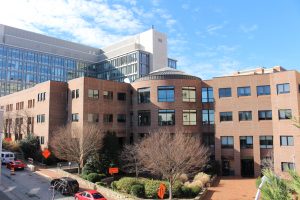
Random changes can occur in a person’s DNA on a daily basis due to sun exposure, smoking or other factors. Thankfully, the body can often repair the damage. When it can’t, however, those genomic changes can lead to cancer.
Scientists from around the country will convene in Chapel Hill April 2-3 for the UNC Lineberger Comprehensive Cancer Center’s 42nd Annual Symposium to share their latest findings into how DNA can be damaged, or altered in cancer, how to capitalize on genomic changes to develop new therapeutics, and how to help the immune system to attack cancer.
The theme for the free symposium is “Genome Instability in Cancer: Mechanisms and Therapeutic Opportunities.” Scientists will present 17 talks that range in topic from cellular responses to DNA damage, novel approaches to leverage abnormal DNA repair in cancer, and strategies to predict or enhance immunotherapy based on DNA repair abnormality.
The symposium’s organizers are Al Baldwin, PhD, UNC Lineberger’s associate director for basic research and the William Rand Kenan Professor of Biology, Gaorav Gupta, MD, PhD, assistant professor in the UNC School of Medicine Department of Radiation Oncology and Department of Biochemistry and Biophysics, and UNC Lineberger member, and Dale A. Ramsden, PhD, a professor of biochemistry and biophysics and UNC Lineberger member.
In the past decade, scientists have learned an “immense” amount of information about the abnormal genomic makeup of individual cancers, Gupta said. In addition, dramatic advances have been made in the basic understanding of how DNA repair occurs in both normal cells, and in cancer. There have been advances in leveraging genomic advances to improve cancer therapy, and exciting efforts are ongoing to exploit abnormal DNA repair in cancer for treatment.
“What’s really special about the symposium that we’ve put together is it brings together the basic scientists who are improving our understanding of cancer biology with the translational scientists who are focused on aspects of the DNA damage response as it pertains to improving cancer therapy,” Gupta said. “This collection of experts will uncommonly be seen at the same scientific conference. I think the singular focus is to emphasize the clinically relevant aspects of this topic, and bring together all of the diverse experts in the field.”
Baldwin said genomic instability can both be a boon for cancer — to help it develop therapeutic resistance — but it is also a weakness that can be exploited.
“Ongoing DNA damage, and genomic instability, can allow cancers to develop resistance to treatment,” Baldwin said. “Genomic instability is also a vulnerability for cancer in a way,” he added. “DNA mutations can drive the production of what’s known as ‘neo-antigens,’ which are important for response to the disease by the immune system.”
UNC Lineberger’s symposia have tracked advances in the understanding and treatment of cancer since 1977. The symposium was launched just two years after the National Cancer Institute formally recognized UNC Lineberger as a cancer center. Joseph Pagano, MD, UNC Lineberger’s founding director and Lineberger Professor in Cancer Research, said the goal for creating the symposium was to bring cancer research at UNC to the attention of national experts, and to educate faculty as well as the community.
“This is our 42nd annual symposium that follows the tradition that Dr. Pagano started of having an international-quality meeting in our backyard for trainees, faculty members and others to learn about an important topic in cancer research,” Baldwin said. “It’s an opportunity to meet and exchange ideas.”
The symposium will be held at the William and Ida Friday Center for Continuing Education and run from 8:50 a.m. – 4:30 p.m. on Monday, April 2, and 9 a.m. – 12:30 p.m. on Tuesday, April 3. Registration is available online and on-site. An optional lunch, which costs $17.25, can be ordered when registering. For questions, contact Melissa Mack at estroud@med.unc.edu.
